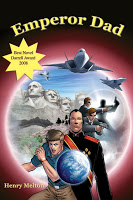My life changed. Taking a risk, I had accepted an early retirement offer from the company where I had worked for twenty-some years. The company had changed, and my children were grown. The numbers seemed reasonable. I could quit writing database code that seemed increasingly irrelevant to me, and I feared, to the company.
So one day I brought home a cardboard box of awards plaques and file folders of my training, personnel records, etc. and set it in the corner of my home office. My intent was to spend more time writing.
But what to write? I had written and had published a number of science fiction short stories. I had also written some novels, but none of them had attracted the attention of publishers or agents.
With the newfound freedom of working at my own pace, rather than fitting it in between testing SQL statements and writing Perl modules, I let my mind drift a little. How about pick a topic and write — short fiction or longer, let the story set the length?
With no idea more than teleportation as overlapping three-dimensional spheres, I started writing, vaguely autobiographically. The setting was my house. The character was a younger, smarter version of myself. I developed the idea of the teleportation. I worked out some details about how it might be discovered.
But the narrative dragged. It was far too easy to lecture. I set the story aside for awhile.
I had been attending a number of science fiction conventions and writing conferences. A lot of the advice didn’t seem to fit me, but one panel about Young Adult fiction had a question for the authors that resonated with me. What is your internal age? How old are you inside?
A lot of my writing had been with characters a lot younger than my calendar age. Some of them had been about right for the YA label. I’d even been told that before by people who had read my work, but it hadn’t stuck.
Maybe I was a YA author, and didn’t know it.
I went back to my stalled out manuscript and took a good hard look at a secondary character, the teenage son of the inventor. What if I took his viewpoint?
I trashed most of what I’d written and tried again, only with the son James (my middle name) as the main character. Part of it had to be written from the father’s perspective, but most of it flowed well as the story of James, who hacked into his dad’s computer to run computer games and discovered the controls to his father’s teleportation system. James had to figure out how everything worked, and just why his father had taken such elaborate measures to hide everything — not just from him, but from his mother as well, and the world.
I plucked a number of episodes from the life of my son Thomas, as he grew up in Hutto, Texas. James wasn’t Thomas, but there were a number of places where they overlapped.
Writing was easy and experimental. I chose to write very short numbered chapters, over a hundred of them, and it was only in the final stages that I divided the story into nine named sections.
By the time I was done, I had a novel that was slightly shorter than the novels I had written before. But this was what I had decided — let the story pick the length, and this was what came out.
From 2003 through 2005, I circulated the novel to agents and publishers, but it was gradually seeping into my skull that the nature of publishing had changed. This story didn’t match the checklist demanded by New York publishers.
Rather than shelve the story, as I had several other novels, I put my toe into the self-publishing arena by making a PDF and selling it directly from my website. A few people bought it — friends and relatives, but it never took off. Still, the idea had caught root. By 2007, I had done some homework and published a trade paperback copy through Lulu. It was a learning experience. Lulu’s costs plus the discount necessary to sell to a bookstore meant it was priced much too high. I had also gotten some painful assessments of its layout and formatting. As it was, the book would never sell.
But that was just the bad news. People liked the story. Someone had gotten a copy of the book and submitted it to the Mid-South-Con’s Darrell Award contest. While I wasn’t sure it was eligible, it won, and Emperor Dad was now an award-winning novel. It was just the right push at the right moment.
I established a publisher’s account through Lightningsource to make books at a lower price-point and promptly produced the second edition, with some typo corrections, a better layout, and a starburst on the cover proclaiming its award.
While there’s still a stash of first-edition copies in a corner of my office for people who request them, the second-edition is out on my table, selling well (for me) and continually gaining new fans.
This is still my experimental novel. It’s the only one with a 99¢ price tag on the ebook stores (for now) and the first novel I serialized for my Henry’s Stories online magazine. I don’t think I’ll ever let it go out of print.
